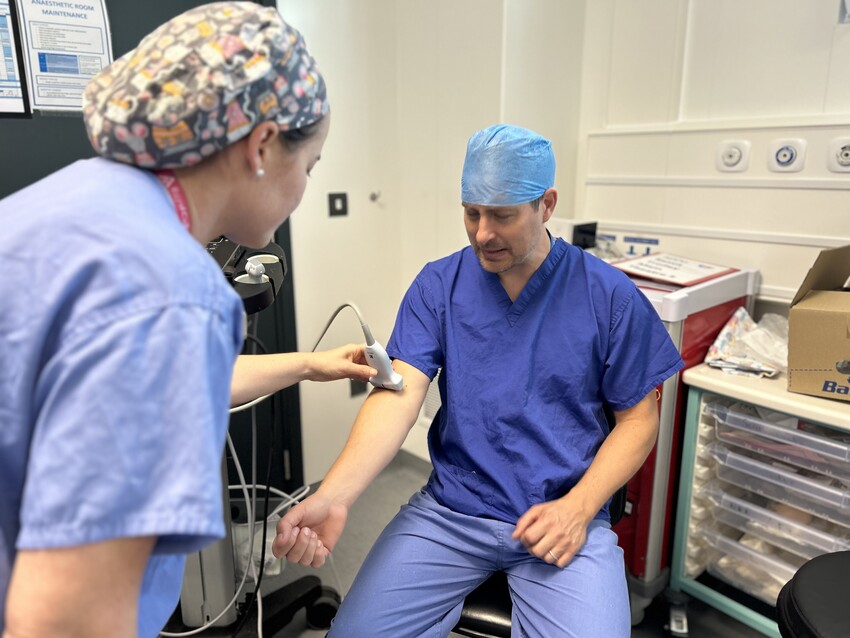Stage 2 Training
The latest information on the 2021 curriculum and assessments can be accessed on the RCoA Training Hub, together with information on Dual training in FICM and Anaesthesia.

Generic Professional Domains
The non clinical domains that demonstrate the Generic Professional capabilities of all Doctors are part of the RCOA 2021 anaesthesia curriculum. The 7 Generic Professional Domains are found across stages 1, 2 and 3. To support residents across all stages of training we have developed a series of short lectures which are the basics and building blocks for these modules. Residents across all 3 stages should complete these online lectures and complete a reflection. This reflection should be uploaded to the Lifelong learning platform as evidence of completion of the lecture series and should be thoroughly discussed with the Educational supervisor. The ES will be asked to make specific comments on the resident's reflections as part of the ESSR. These lectures are the core principles and residents will be expected to demonstrate progression in these modules by adding reflection on other activities as well as the relevant supervised learning events (SLEs) eg QI project, audit cycle, guideline development etc.
An Overview of the Generic Professional Domains by Dr Caroline Evans
Professional behaviours and communication
- Reflection by Dr Zarah Paris
- Consent by Dr Amrit Dhadda
- Wellbeing by Dr Laura McClelland
Management and Professional and Regulatory Requirements
- The NHS is Wales by Dr Alex Kennedy
- Organisational Cultures and Leadership Styles by Dr Lucy Stacey
- Emotional Intelligence by Dr Isra Hassan
Safety
- Patient Safety, Critical Incidents; Reporting and Responding by Dr Jake Hartford Beynon
- Patient Safety by Dr Jake Hartford Beynon
- Patient Safety & the role of Human Factors by Amy Cardwell
Quality Improvement
- An introduction to QI Methodology by Dr Gethin Pugh.
- A-QIPAT: Assessment of QI activities by Dr Gethin Pugh
Safeguarding
- Managing the child with additional needs by Dr Tom Moses
- Managing the adult with additional needs by Dr Iwan Morris
Education and Training
- Building a Teaching Portfolio by Dr Dafydd Evans.
- Organising a Study Day by Dr Cat Griffiths.
- Education and Training in the 2021 curriculum by Dr Crawford Deane.
Research and Managing Data
- Research & Information Governance by Dr Danielle Huckle
- How to get published as a resident by Dr Yavor Metodiev
- The Role of the Research Ethics Committee by Dr Charles Horwood
Team Working
No presentations have been created for this domain because you should easily be able to reflect and evidence how you work as part of a team in your day to day practice.
HEIW Quality Improvement Training Resources
HEIW has a range of very useful study days aimed at fulfilling the requirements for Quality Improvement and Safety.
QIST training resources can be accessed here here.
Stage 2-3 Professionalism day - Sustaining a career in Anaesthesia/Intensive care medicine
A novel and interactive day, highlighting some of the areas that challenge anaesthetic residents as they progress in training. Focus areas include decision making and building resilience, reflecting and dealing with imposter syndrome. This event is run regularly and places are limited so book your place early.
Stage 2 Regional Anaesthesia Training days
This new course designed to build on the regional anaesthesia Stage 1 skills course, is delivered as a workshop-based course to help support achievement of the curriculum requirements for Stage 2 training. The course uses a variety of approaches including Ultrasound-guided RA, simulation and other practical modalities. Residents are supplied with pre-course reading material and a questionnaire to assess current level of practice and knowledge. There are also workshops focussing on communication, consent and associated risks with anti-coagulation. Emergencies in RA are also considered and a session on debriefing and providing feedback is included.
The course is free for all ST4-5 residents. Please contact Dr Paul Carter for further details and book via the link in the latest news section.
Educational Development Time
In order to support residents achieving the GPC domain capabilities, the RCoA have produced guidance on the provision of specific time in the working week i.e. Educational Development Time (EDT) for developing and assessing skills to support learning and assessment in professional practice. The RCoA has a suggested time required for each stage of training, recommending residents in anaesthetic posts in Stages 1 and 2 of the curriculum on both Core Anaesthetic Training and ACCS pathways should be allocated up to 2 hours of EDT per week. Those in Stage 3 should be allocated up to 4 hours per week, reflecting the requirement for greater involvement in some of these areas in the later stages of the training programme.








